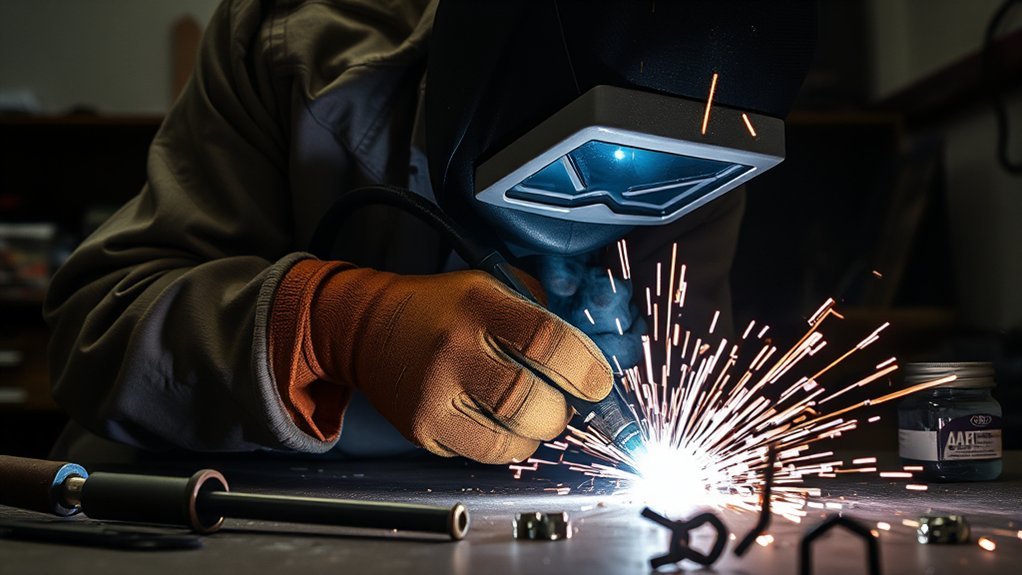Welding insurance typically costs between $100 and $438 per month, depending on your coverage needs and business specifics. General liability insurance averages around $123 monthly, while a Business Owners Policy (BOP) costs about $98. Workers’ compensation can range considerably based on payroll and claims history, averaging $254. Factors such as geographical location and risk level also influence rates. Understanding these aspects can help you secure the best coverage at a competitive price. There’s more to explore about insurance options and savings strategies.
Understanding Welding Insurance Basics

When you immerse yourself in welding insurance, it’s important to grasp the various coverage options available and their associated costs. Understanding the different insurance types is essential for effective risk assessment in your welding business.
General liability insurance, averaging $123 per month, protects you against lawsuits related to bodily injury and property damage. Workers’ compensation insurance, typically around $254 monthly, covers medical expenses for job-related injuries, which is critical for safeguarding your employees.
Additionally, if you own business vehicles, commercial auto insurance, averaging $173 per month, is mandatory for protection against accidents. Each of these coverage options addresses specific risks, so evaluating your needs can help guarantee you’re adequately protected while managing costs effectively.
Average Costs of Welding Insurance

Welding insurance costs typically range from $100 to $438 per month, depending on the types of coverage you choose and specific factors related to your business. Understanding these costs is essential, as different insurance providers offer varying rates based on welding risks associated with your operations.
For instance, general liability insurance averages about $123 monthly, while a business owner’s policy (BOP) can be around $98. If you need workers’ compensation, expect to pay approximately $254 each month, which covers medical expenses for injuries on the job.
For mobile welding operations, commercial auto insurance averages $173. Opting for a detailed insurance bundle, including BOP, workers’ compensation, and professional liability, totals around $438, providing robust protection for your business.
Breakdown of General Liability Insurance Costs

When considering general liability insurance for your welding business, it’s vital to understand how coverage limits affect your premiums.
You’ll also notice significant variations in rates depending on your state, reflecting local risks.
Additionally, the size of your business and operations can further influence your insurance costs, so evaluating these factors is essential for accurate budgeting.
Coverage Limits Impact Premiums
Although you might be tempted to select the lowest coverage option for general liability insurance, understanding how coverage limits impact premiums is essential for any welder.
Here’s what you need to take into account:
- Standard Limits: A typical policy starts at $1 million per claim; higher limits lead to premium adjustments.
- Risk Factors: Projects with higher risks require more significant coverage enhancements, increasing costs.
- Business Size: Your business scale—solo or larger—can affect your premium range, averaging between $899 to $2,900 annually.
- Claims History: A history of frequent claims can push your premiums higher, as insurers account for potential payouts.
State-Specific Rate Variations
Understanding the nuances of state-specific rate variations is essential for welding businesses looking to manage their insurance costs effectively. State regulations and local market conditions play a significant role in these variations, impacting your risk assessment. Here’s a breakdown of general liability insurance costs across a few states:
| State | Average Monthly Cost | Key Factors Influencing Rates |
|---|---|---|
| Maine | $144 | Low claims history, favorable regulations |
| New York | $193 | High claims frequency, stringent regulations |
| California | $185 | Competitive market, higher risk assessments |
| National Avg | $166 | Varies by state and business specifics |
Business Size Considerations
The size of your welding business can greatly affect your general liability insurance costs. Understanding how these factors interplay is essential for managing your expenses effectively. Here are key considerations:
- Business Size: Smaller companies generally pay less, especially those with only a couple of employees.
- Operational Scope: Larger operations or those tackling high-risk projects face higher premiums due to increased liability exposure.
- Claims History: A strong safety record can lead to lower premiums, while a history of claims will raise costs.
- State Variations: Insurance costs differ considerably based on your location, with states like New York being more expensive than Maine.
Evaluate these elements to optimize your insurance strategy and protect your business financially.
Workers’ Compensation Insurance Pricing

When considering workers’ compensation insurance for welders, various factors can greatly impact your annual costs, which typically range from $2,450 to $7,000. Insurers often charge between $7 to $18 per $100 of payroll. Your safety records play a vital role; poor records can lead to higher premiums. Additionally, state regulations and claim rates can greatly influence pricing, with some regions imposing steeper costs due to increased injury claims.
| Factor | Impact on Cost | Description |
|---|---|---|
| Safety Records | High | Poor records raise premiums |
| Claim Rates | Variable | Higher claims increase costs |
| Number of Employees | Direct correlation | More employees often mean higher costs |
| State Regulations | Significant | Laws can affect overall pricing |
Business Owners Policy (BOP) Expenses

For welders looking to protect their business, a Business Owners Policy (BOP) offers a thorough solution at an average cost of about $98 per month or $1,173 annually.
The BOP combines multiple coverages, leading to significant BOP benefits, especially for small, low-risk businesses, which typically meet BOP eligibility criteria.
The BOP offers essential benefits by merging coverages, ideal for small, low-risk businesses meeting eligibility criteria.
Here are four key advantages:
- Bundle Savings: Combining general liability and commercial property insurance often results in lower premiums than purchasing separately.
- Comprehensive Coverage: Protects against vandalism, theft, and property damage.
- Simplicity: One policy simplifies your insurance management.
- Customizable Options: Tailor coverage to your welding business needs.
Investing in a BOP could be a strategic move to mitigate risks and safeguard your livelihood.
Factors Influencing Insurance Premiums
Understanding the factors that influence welding insurance premiums is essential for managing costs effectively.
Geographic location plays a significant role, as state regulations and historical claim patterns vary widely. Your business’s safety record and claims history directly affect your premium rates; a history of incidents can elevate your costs.
Additionally, the specific work environment and types of welding you perform introduce different welding hazards, which insurers evaluate when appraising risk.
The number of employees and payroll size also impact workers’ compensation rates—more employees generally lead to higher premiums.
Finally, the coverage limits and the value of your tools and equipment determine overall insurance costs; higher limits and more valuable assets will increase your premiums.
State-by-State Cost Variations
Although insurance costs can vary widely, it’s essential to recognize how state-specific factors can greatly impact your welding business’s premiums.
Here are four key aspects to evaluate:
- General Liability: Maine averages $144/month, while New York tops at $193/month.
- Workers’ Compensation: North Carolina offers the lowest rates at $100/month, contrasting with New York’s $137/month.
- Professional Liability: Nationwide averages $77/month, with Maine at $66/month and New York at $90/month.
- Business Owners Policy (BOP): Costs range from $210 in North Dakota to $283 in New York.
Geographical factors, state regulations, and historical claims patterns play critical roles in determining these premiums.
Understanding these variations allows you to better anticipate your insurance costs.
Bundling Policies for Savings
When you bundle insurance policies, like general liability and workers’ compensation, you not only simplify your coverage but can also save up to 10% on your premiums.
Considering a typical insurance bundle for welding businesses costs around $438 monthly, consolidating your policies enhances your value while minimizing risk exposure.
By incorporating Business Owners Policies (BOP) and professional liability insurance into your package, you gain extensive protection against various risks.
Many insurance providers actively promote premium discount strategies for bundled policies, making it financially beneficial for small welding businesses.
Streamlining your insurance management through these package benefits not only saves you money but also guarantees you’re adequately covered, reducing the likelihood of unforeseen expenses down the road.
Tips for Obtaining Affordable Quotes
To secure affordable quotes for your welding insurance, you should actively seek multiple quotes from various insurers. Engaging in quote comparison allows you to identify the best rates tailored to your needs.
Actively seek multiple quotes from insurers to find the best rates for your welding insurance needs.
Here are four effective tips to keep your costs down:
- Bundle Policies: Combine general liability, workers’ compensation, and commercial auto insurance to save up to 10% on premiums.
- Raise Deductibles: Opting for higher deductibles can greatly lower your monthly payments.
- Maintain a Good Safety Record: A clean claims history can make you eligible for lower premiums.
- Tailor Your Coverage: Customize your policy to meet your business requirements while avoiding unnecessary add-ons, facilitating better premium negotiation.
Implement these strategies to maximize your savings on welding insurance.
Common Coverage Types for Welders
Securing affordable welding insurance is only part of the equation; understanding the coverage types available is equally important for protecting your business.
General liability insurance, averaging $123 monthly, covers lawsuits related to bodily injury and property damage, essential for welding safety.
A Business Owner’s Policy (BOP), at about $98 per month, combines general liability with commercial property insurance, shielding you against vandalism and theft.
Workers’ compensation, critical for meeting insurance requirements, averages $254 monthly and covers medical expenses for injuries.
Additionally, commercial auto insurance protects your business vehicles, averaging $173 per month, while tools and equipment insurance, at just $14 monthly, safeguards your essential gear.
Each coverage type plays an important role in mitigating risks associated with welding.
Frequently Asked Questions
What Types of Welding Work Require Specialized Insurance Coverage?
If you’re engaged in high-risk welding tasks like underwater or industrial welding, you’ll need specialized insurance. These coverage options protect against welding hazards, ensuring you’re financially secure against potential accidents or damages in your work environment.
Can I Insure My Welding Equipment Separately?
Yes, you can insure your welding equipment separately. Protecting against equipment theft is essential; specialized policies cover loss, ensuring your investment’s safe. Analyze your needs and risks to choose the right coverage for you.
How Can I Lower My Welding Insurance Premiums?
To lower your welding insurance premiums, utilize discount strategies like bundling policies, maintaining a clean safety record, and seeking premium comparison among providers. Analyze your coverage needs to avoid unnecessary expenses while ensuring adequate protection.
Is Welding Insurance Mandatory for Small Businesses?
Welding insurance isn’t mandatory for small businesses, but like a safety net, it protects against risks. Complying with welding regulations, it provides essential insurance benefits, helping you navigate potential liabilities and secure your company’s future.
What Is the Claims Process for Welding Insurance?
To initiate the claims process for welding insurance, you’ll need to gather claims documentation and submit it to your insurer. Insurance adjusters will then review your information to determine coverage and assess any potential payouts.
Conclusion
In the world of welding, securing the right insurance is like forging a strong bond in metal—essential for withstanding the heat of risks. By understanding costs and exploring various policies, you can shield your business from unexpected sparks. Picture your workshop, buzzing with activity and confidence, knowing you’re protected from potential setbacks. Keep your budget in mind, and you’ll find the coverage that fits seamlessly, allowing you to focus on creating your next masterpiece without fear.


